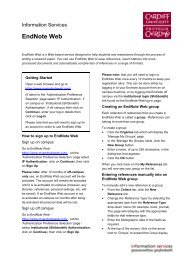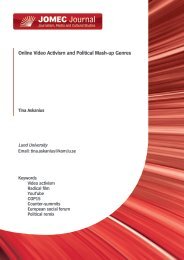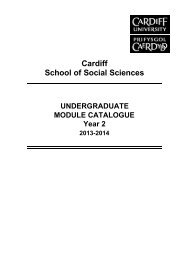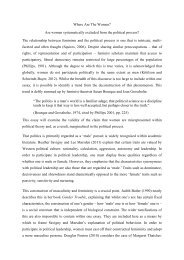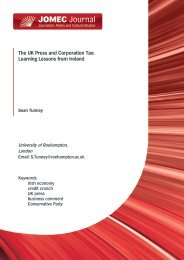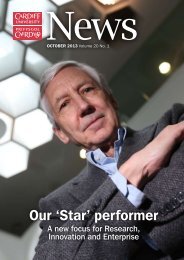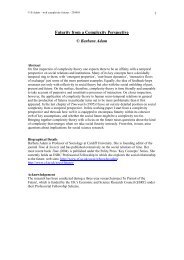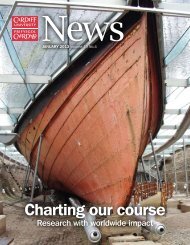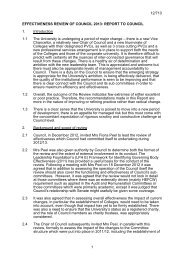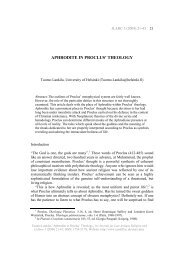Book Reviews - Cardiff University
Book Reviews - Cardiff University
Book Reviews - Cardiff University
Create successful ePaper yourself
Turn your PDF publications into a flip-book with our unique Google optimized e-Paper software.
JLARC 7 (2013) 97-105<br />
98<br />
only scratch the surface of what may in each case be a whole research area, open to a<br />
wide range of interdisciplinary possibilities (for example with Archaeology, Oriental<br />
Studies, Semitic Studies etc.), but the merit of this book is that these strings are held<br />
together in an attempt to outline possibilities and opportunities which they may provide,<br />
and also point to their deeper significance and anthropologically and theologically more<br />
relevant dimensions.<br />
The book is divided into ten chapters. The first chapter, “Beginnings”, covers more or<br />
less the same ground which in traditional parlance is known as “Pre-Socratic Philosophy”.<br />
But Clark questions the traditional narrative which tends to depict this as a movement<br />
from “mythos to logos”, from a pre-rational to a rational approach to reality. The world<br />
into which the pre-socratic philosophers were born (from, say, the seventh century BC<br />
onwards) was already an ancient world. There were ancient cultures which for several<br />
thousands of years had tried to provide rational explanations for phenomena such as, for<br />
example, marine fossil finds in alpine rock formations (pp. 1-2). The fact that many of<br />
these explanations combined (Clark: “confounded”) down-to-earth reasoning with otherworldly<br />
fascination (note p. 19 the point that the Greek word for “god”, theos, originally<br />
meant “amazing”) does not per se make them less rational than say, the hyper-rationalist<br />
explanations (and applications) of some Hellenistic thinkers. “Even if Hippocrates of Cos<br />
(c450-c375BC) or his disciples helped to define the healer’s art, we had better not use<br />
their medicines,” Clark writes (p. 21). Our knowledge of ancient knowledge is patchy to<br />
say the least, he adds. We do not know in what way, if at all, theories influenced practical<br />
developments. We have next to no accounts of practitioners. Still, the few extant accounts<br />
of theoreticians might help us to put our present-day “world of science” in perspective.<br />
Who knows which of our cherished beliefs in “scientific truths” (which seem so obvious<br />
to many of us today) may yet turn out to be “entirely wrong”, or which “past philosophers<br />
may really have been correct” (p. 22)?<br />
The second chapter (“Influence from outside”) considers this historical fact (namely that<br />
Greek philosophy, already from its outset, found itself in an ancient world) from a more<br />
historico-geographical angle. Greek myths contain elements of Mesopotamian epics which<br />
emerged more than a thousand years earlier, such as those of Atrahasis or Gilgamesh (p.<br />
24). These epics also influenced the oldest layers of the Hebrew Bible. Already ancient<br />
Greek accounts drew links between ancient cultural founder figures (Hammurabi, Moses,<br />
Minos) and acknowledged their indebtedness to Babylonian, Persian, Egyptian and even<br />
Scythian cultural and scientific achievements (writing, mathematics, astronomy, poetry,<br />
askesis and divination). But there were also Greek accounts which belittled the barbarian<br />
achievements and in the name of reason proposed counter-myths according to which the<br />
savage cultures had no choice but to form modern states in order to survive, or else to end<br />
up as colonised subjects of modern states. Clark suspects that such “rationalist” countermyths<br />
as formulated by a range of Greek thinkers (Clark cites a passage from Diodorus as<br />
an example), could be at least in part politically motivated (p. 54). Perhaps, Clark writes,<br />
“presently established powers found it convenient to suggest that there was no alternative<br />
to Leviathan, and that a ‘state-less’ society was a contradiction” (ibid.).<br />
Chapter Three (“Inspired Thinkers”) explores further the source of rational thinking,<br />
which is itself beyond reason and found in those who are divinely inspired. While some<br />
held (already in Antiquity) that man created gods in his own image, Clark points out that<br />
some of the most respected religions in Antiquity, among them the religion of the Jews<br />
and Zoroastrianism, “denied that God could be pictured” (p. 56). Divine knowledge was<br />
for those inspired by the divine, and even those had to empty and purify themselves and<br />
exceed the highest ethical and intellectual standards. The fact that in the case of Judaism<br />
<strong>Book</strong> <strong>Reviews</strong> in: Journal for Late Antique Religion and Culture 7 (2013) 97-105;<br />
ISSN: 1754-517X; Website: http://www.cardiff.ac.uk/clarc/jlarc



